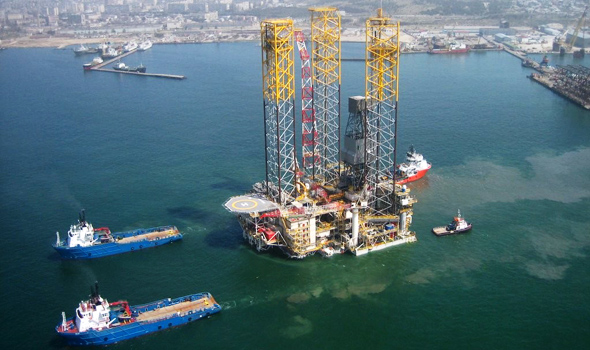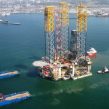
SOCAR and Other Shah Deniz Producers Reconfiguring Pipeline Consortiums
Publication: Eurasia Daily Monitor Volume: 10 Issue: 132
By:

The gas producers’ consortium at Shah Deniz in Azerbaijan has selected the Greece-Italy route, known as the Trans-Adriatic Pipeline (TAP) project, for transportation of that field’s production to European markets. The selection of TAP has eliminated the Nabucco-West project, ending a four-year contest between the two pipelines over priority access to Azerbaijani gas (see EDM, June 25, 27, 28).
Almost 900 kilometers long, the TAP pipeline is planned to run from the Turkish-Greek border (Greek inception point now changed to the Kipoi border station, instead of the town of Komotini situated deeper inland). TAP will run 550 kilometers across northern Greece to Dipotamia, continue into southern Albania to the port of Fier, and cross the Adriatic seabed to San Foca in the heel of the Italian peninsula’s boot, there to connect with Italy’s pipeline grid. The TAP pipeline is designed to carry 10 billion cubic meters (bcm) of gas annually, expandable potentially to 20 bcm by adding compressor power. Cost estimates are not yet publicly available. Construction work is now envisaged to start in early 2015 and be completed in 2019 for the first flow of Azerbaijani gas (www.trans-adriatic-pipeline.com, accessed July 17).
TAP forms the westernmost segment of the planned Southern Corridor to Europe for Caspian gas. The plan involves moving the gas from the Caspian offshore via Azerbaijan, Georgia and Turkey to the European Union’s border and onward into EU territory. The Turkish segment, longest by far, is the Azerbaijani-led Trans-Anatolia Pipeline (TANAP) project designed to feed into TAP and potentially other continuation pipelines into Europe.
The gas producers’ selection of the TAP pipeline route should accelerate the final investment decisions (FIDs) in both extraction and transportation. The Shah Deniz consortium’s leading companies are now in the process of acquiring ownership stakes in the pipelines along the planned route.
The Shah Deniz producers’ consortium includes BP (formerly British Petroleum, as operator) and Norwegian Statoil with 25.5 percent of the shares each; Azerbaijan’s State Oil Company (SOCAR), Total of France, Russian Lukoil, and the National Iranian Oil Company with 10 percent each; and Turkish Petroleum with 9 percent. BP, Statoil, SOCAR and Total are the decision-making companies in this consortium. Of these four companies, Statoil alone is a partner in the TAP pipeline consortium at the same time.
The TAP consortium includes Statoil (the lead company) and AXPO of Switzerland with 42.5 percent of the shares each, with German E.ON Ruhrgas holding 15 percent. Pursuant to an agreement signed by both groups on August 9, 2012, the producer companies SOCAR, BP and Total shall each receive options to acquire up to 20 percent, 20 percent, and 10 percent, respectively, of TAP’s shares, in the event that they selected the TAP pipeline project, as they ultimately did.
Meanwhile, AXPO has announced that it intends to reduce its stake in TAP to a single-digit level, apparently in order to limit AXPO’s investment in the construction of TAP (SonntagsZeitung, June 30). Conversely, Belgium-based Fluxys (a major operator of gas transmission pipelines and storages in six countries, mainly in Europe’s northwest) has announced its intention to become a stakeholder in TAP. These sell-and-purchase options for TAP shares are time-limited (by some accounts the options can be exercised within one month from the pipeline selection’s official announcement, which was June 28).
On June 11, SOCAR won the international tender for acquisition of a majority interest in Greece’s gas transmission system, DESFA, for €400 million ($524 million) (see EDM, June 25). With this, SOCAR takes over 66 percent of DESFA’s shares, plus minority ownership of the Interconnector Greece-Bulgaria, in which DESFA is a stakeholder.
On July 3, TAP and DESFA signed a technical cooperation agreement on day-to-day operation and maintenance of DESFA pipelines and supervision of their interconnection points (apparently to connect DESFA lines with the planned TAP and the planned Interconnector to Bulgaria). SOCAR will presumably be in charge of this arrangement, given its unique combination of stakes in both DESFA and TAP. This fits in with SOCAR’s priorities to sell certain volumes of gas to Bulgaria (through the Interconnector from Greece), as well as using DESFA pipelines for marketing its gas directly to Greek consumers (Athens News Agency, July 4, 8, 10, 11; Novinite, July 17).
SOCAR currently owns 80 percent of the shares in TANAP, along with the operating rights. Turkey’s Botas and Turkish Petroleum hold 15 percent and 5 percent, respectively. SOCAR plans to distribute minority stakes in this project to BP, Statoil, and Total (by some accounts, Turkey seeks to enlarge the stake it already holds). SOCAR plans to retain at least 51 percent ownership and the operator’s role in the TANAP project, which Azerbaijan has itself initiated and designed.




